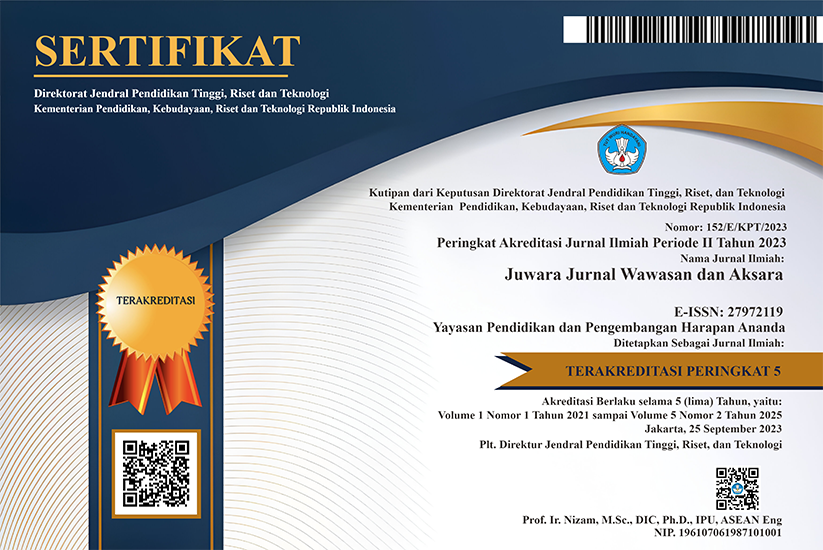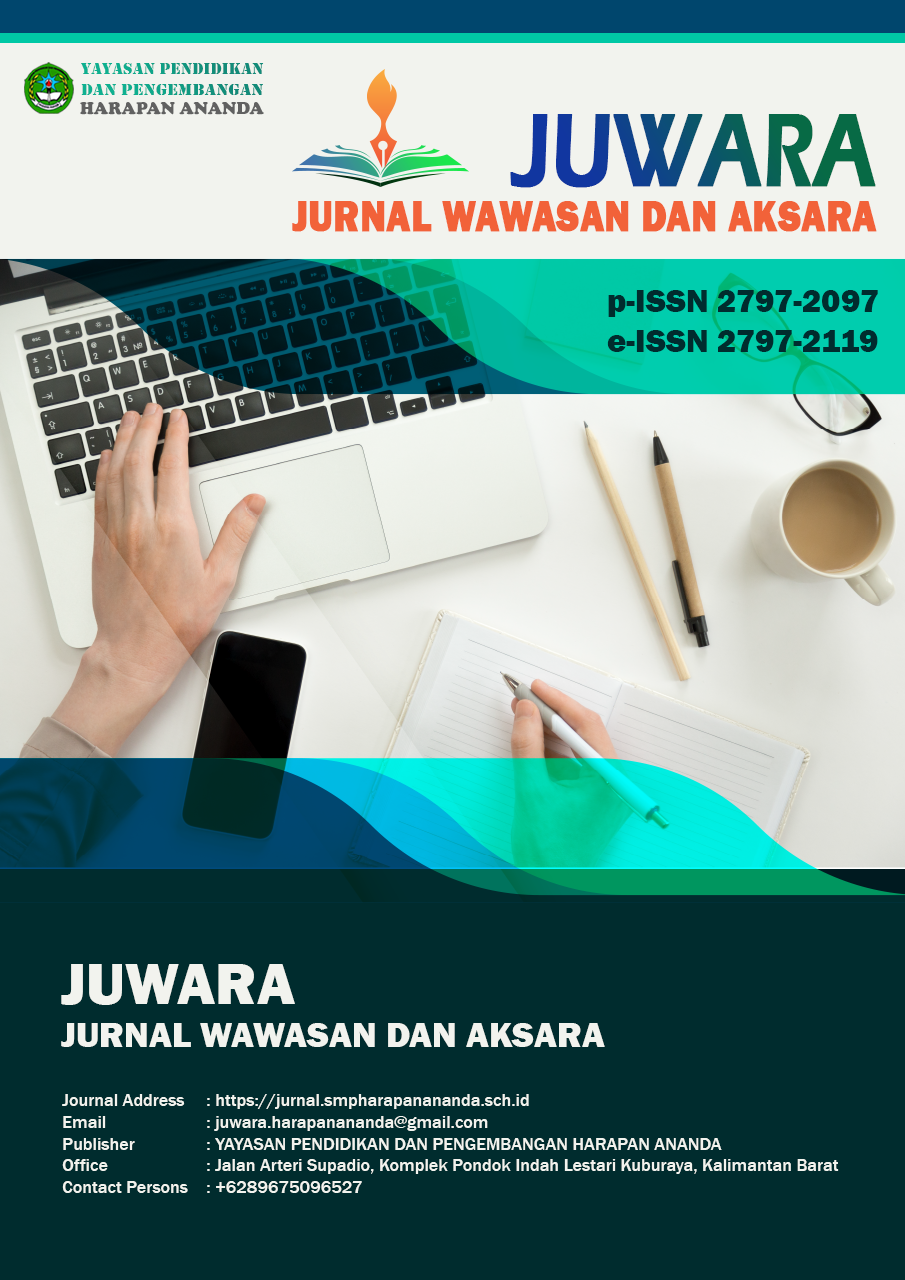Analysis of Speaking Learning Strategies Used by Introvert Students
DOI:
https://doi.org/10.58740/juwara.v5i1.485Keywords:
introvert students, speaking, speaking learning strategiesAbstract
Speaking strategy is a method taken by language learners to solve problems when learning to speak. Speaking learning strategies have two types, namely direct speaking learning strategies which consist of memory strategies, cognitive strategies and compensatory strategies, while indirect speaking learning strategies consist of metacognitive strategies, affective strategies and social strategies. The use of speaking strategies is widely used by language learners, including language learners who have introverted personalities. Introverted personalities usually tend to prefer doing things themselves, focusing more on their own thoughts. The aims of this research to analyze the speaking learning strategies used by introvert students. This research uses qualitative research methods by taking five introverted based on the results of the MBTI test. Researchers used interviews and questionnaires as data collection techniques. The research results showed that introverted students used four speaking strategies, namely memory strategies, cognitive strategies, compensatory strategies and meta-cognitive strategies. The research results also show that cognitive strategies and compensatory strategies are the strategies most frequently used by introverted students from the 4th semester English education study program in Universitas Muhammadiyah Kotabumi.
References
Alfian, A. (2021). The favored language learning strategies of Islamic university EFL learners. Studies in English Language and Education, 8(1), 47–64. https://doi.org/10.24815/siele.v8i1.17844
AlSaqqaf, A., Yang, Y., & Hu, K. (2024). The Effectiveness of the Incentive Autonomous Learning Strategies (IALS) Module to Improve Chinese Non-English Major Undergraduates’ EFL Speaking Proficiency. Journal of Language Teaching and Research, 15(3), 843–852. https://doi.org/10.17507/jltr.1503.17
Annas Alkhowarizmi, Setiawan, F., & Herlina, N. (2024). The Implementation of Cooperative Learning in Teaching Reading Comprehension to Introvert and Extrovert Students. Journal of English Language Learning, 8(1), 465–470. https://doi.org/10.31949/jell.v8i1.9154
Ashraf, N., Ahmad, R. S., Bano, S., Azeem, H. M., & Naz, S. (2024). Enhancing MBTI Personality Prediction from Text Data with Advance Word Embedding Technique. VFAST Transactions on Software Engineering, 12(3), 35–43. https://doi.org/10.21015/vtse.v12i3.1864
Aziz, A. A. (2021). ESL Learners Challenges in Speaking English in Malaysian Classroom. November. https://doi.org/10.6007/IJARPED/v10-i2/10355
Buchta, L., Kozovsky, M., & Blaha, P. (2025). A Dead-Time Compensation Strategy Based on an Online Learned Artificial Neural Network. IEEE Transactions on Industrial Electronics, PP, 1–11. https://doi.org/10.1109/TIE.2025.3544207
Callahan, K. (2021). Valuing and Supporting Introverted Students in the Virtual Design Classroom. International Journal of Art & Design Education, 40(4), 714–722. https://doi.org/10.1111/jade.12383
Cerkez, N., Vrdoljak, B., & Skansi, S. (2021). A Method for MBTI Classification Based on Impact of Class Components. IEEE Access, 9, 146550–146567. https://doi.org/10.1109/ACCESS.2021.3121137
Citra, M., & Zainil, Y. (2021). Language Learning Strategies in Speaking Classroom Activity: Extrovert and Introvert Learners. https://doi.org/10.2991/assehr.k.210325.030
Godfrey, E., & Koutsouris, G. (2024). Is personality overlooked in educational psychology? Educational experiences of secondary-school students with introverted personality styles. Educational Psychology in Practice, 40(2), 159–184. https://doi.org/10.1080/02667363.2023.2287524
Guo, M. (2022). A Practical Study on English-Speaking Learning Strategies of Junior College English Majors. https://doi.org/10.2991/assehr.k.220706.070
Hogan, R., & Sherman, R. A. (2020). Personality theory and the nature of human nature. Personality and Individual Differences, 152, 109561. https://doi.org/10.1016/j.paid.2019.109561
Jumareng, H., Mongsidi, W., Setiawan, E., Patah, I. A., Rahadian, A., & Gani, R. A. (2021). Introvert and extrovert personality: Is it correlated with academic achievement of Physical Education, Health and Recreation students at university level? Journal Sport Area, 6(2), 140–146. https://doi.org/10.25299/sportarea.2021.vol6(2).6324
Manuhutu, N., Hartono, R., Faridi, A., & Sakhiyya, Z. (2025). Developing Introverted and Extroverted Students ’ Descriptive Writing through Kalesang Values and FRESH Technique. 4, 302–313. https://doi.org/10.46843/jpm.v4i2.435
Masitoh, I., Supriadi, P., & Marliani, R. (2023). Dampak Kepribadian Introvert dalam Interaksi Sosial. 1(2), 245–249. https://doi.org/10.59996/jurnalpelitanusantara.v1i2.203
May, L., Fahsing, I., Kelly, C. E., Barela, S., Milne, R., & Bull, R. (2024). What is investigative interviewing ( and what is it not )? A primer on the ethos of suspect interviewing. https://doi.org/10.1108/JCP-10-2024-0092
Oktriani, R. A., Damayanti, I., & Hardiah, M. (2021). A Comparative Study Between Extrovert and Introvert Student’s Achievement in English Conversation Course. Journal of English Education and Teaching, 5(4), 582–593. https://doi.org/10.33369/jeet.5.4.582-593
Rahman Hz, B. I. (2022). Exploring Students’ Public Speaking Anxiety: Introvert vs Extrovert. Journal of English Language Studies, 7(1), 107. https://doi.org/10.30870/jels.v7i1.14412
Seng, H. Z., Mustafa, N. C., Halim, H. A., Hanim, N., Amirah, N., Amali, K., Seng, H. Z., Mustafa, N. C., & Halim, H. A. (2023). An Investigation of Direct and Indirect Learning Strategies in Learning Foreign Languages an Investigation of Direct and Indirect Learning Strategies in Learning Foreign Languages. 13(3), 322–338. https://doi.org/10.6007/IJARBSS/v13-i3/16492
Shehni, M. C., & Khezrab, T. (2020). Review of Literature on Learners’ Personality in Language Learning: Focusing on Extrovert and Introvert Learners. Theory and Practice in Language Studies, 10(11), 1478. https://doi.org/10.17507/tpls.1011.20
Sönmezöz, K., U?ur, Ö., & Diri, B. (2020). MBTI Personality Prediction with Machine Learning. 2020 28th Signal Processing and Communications Applications Conference (SIU), 1–4. https://doi.org/10.1109/SIU49456.2020.9302239
Taherdoost, H. (2022). Designing a Questionnaire for a Research Paper: A Comprehensive Guide to Design and Develop an Effective Questionnaire. Asian Journal of Managerial Science, 11(1), 8–16. https://doi.org/10.51983/ajms-2022.11.1.3087
Ullah, A., Uddin, F., Khan, S., & Imran. (2024). Exploring the Impact of MBTI Personality Types on Teaching Methods. Qlantic Journal of Social Sciences, 5(3), 309–323. https://doi.org/10.55737/qjss.559887544
Downloads
Published
How to Cite
Issue
Section
License
Copyright (c) 2025 Dewi Sri Kuning, Agung Prihatmojo

This work is licensed under a Creative Commons Attribution-NonCommercial 4.0 International License.
JUWARA: Jurnal Wawasan dan Aksara provides open access to anyone so that the information and findings in these articles are useful for everyone. This journal's article content can be accessed and downloaded for free, following the creative commons license used.




















